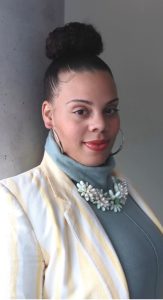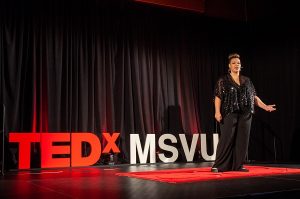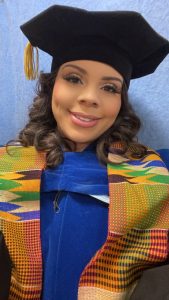 Rajean Willis is a dedicated community leader who demonstrates kindness and empathy in her advocacy and person-centred approach. This spring, she is graduating with her PhD in Educational Studies.
Rajean Willis is a dedicated community leader who demonstrates kindness and empathy in her advocacy and person-centred approach. This spring, she is graduating with her PhD in Educational Studies.
Her doctoral studies examined race-based trauma among African-Nova Scotians using digital storytelling, which led to the development of an educational tool and therapeutic intervention. Throughout her studies, Rajean taught at both Acadia and Dalhousie and published several peer-reviewed articles. While at MSVU, she has been actively engaged within the community. She is a member of MSVU’s Community for Arts-Informed Research and Teaching where she presented her research and was a speaker for the AMI’s TEDxMSVU where she highlighted the resilience of African Nova Scotian women and girls.
Rajean is a proud Indigenous African Nova Scotian woman from Truro, NS with roots in East Preston, Africville, and Shelburne. She has been a social worker for over a decade and has been actively raising awareness about mental health, gambling and substance abuse within the ANS community. She has previously partnered with the Halifax Public Library to produce “Our Stories, Our Experiences,” a talk show that examined social issues faced by the ANS community. She is the past President and current Executive Director of the Nova Scotia Association of Black Social Workers.
Rajean holds Bachelor of Social Work and Master of Social Work degrees from Dalhousie University.
Rajean will deliver her valedictory address during the spring 2025 convocation on Friday, May 16 at 10 a.m. You can watch the ceremony via MSVU’s Facebook and YouTube pages. We asked Rajean to tell us more about her time at MSVU and what’s next for her. Read on to learn more about Rajean.
Hometown: Truro (The “Island”) & Preston Township
Degree being awarded: PhD in Educational Studies
Why did you choose to study at MSVU?
I chose to study at MSVU specifically because of the doctoral program that they offered. I had done my two previous social work degrees at Dalhousie and was interested in studying at a new university. I was also interested in a new field of study (education) which would also closely align with my social work education and experiences. Additionally, as my family had been rooted in Nova Scotia, I was looking for something local that would also offer me flexibility such as online or distance learning which this program did.
Who are your academic and research mentors (either at MSVU or beyond)?
I often reflect upon the significant impact of mentors in my life since I was a child whether they were my parents, family members, community elders, camp counsellors, sports coaches or educators. Mentorship is so important to me. I must start by naming my doctoral supervisor, Dr. Susie Brigham, and my doctoral committee members, Dr. Barb Hamilton-Hinch and Dr. Claudine Bonner. They have contributed to my educational journey at various points dating back to my first years of university. Senator Dr. Wanda Thomas Bernard has also played a huge role in my academic and research mentorship serving as my Master of Social Work thesis supervisor and many community-lead research projects that we have worked on together. Each of these amazing Black women have their own personal mentoring place in my heart.
What class, professor, project or learning activity held the most meaning for you? Why?
This doctoral journey has felt like a true learning opportunity for me and a demonstration of my own leadership abilities within the classroom and beyond.
What is your favourite location on campus and why?
 I would have to say Rosaria because it is where I did my MSVUxWomen Ted Talk in 2019. It was here that I and other extraordinary women took the stage to share transformative stories and it was also in Rosaria that I participated in the CAIRT (Community of Arts Informed Research and Teaching) event to celebrate the Mount’s 150th anniversary.
I would have to say Rosaria because it is where I did my MSVUxWomen Ted Talk in 2019. It was here that I and other extraordinary women took the stage to share transformative stories and it was also in Rosaria that I participated in the CAIRT (Community of Arts Informed Research and Teaching) event to celebrate the Mount’s 150th anniversary.
Do you have any favourite stories about your time at MSVU?
Beyond the speaking opportunities that I shared above, I am reminded of a time where I met with Dr. Brigham about the doctoral program after my first-born child was months old. I had been considering applying to the doctoral program, however, I needed a bit more information and insight to make an informed decision. Dr. Brigham was so welcoming to me bringing my daughter to the meeting which helped me to feel like MSVU was a great choice for me specifically as a mother to young children. All of my children have been born during my time in the program!
What do you think differentiates MSVU from other post-secondary institutions?
I believe that MSVU is truly student-centered. Considering the smaller class sizes, students have a better opportunity to get to know their professors and peers in a different way than larger post-secondary institutions. While I was not on campus frequently, when I was there, I felt a sense of belonging and warmth from those that I encountered.
Do you have any advice for current students or people considering going to MSVU?
As best you can, find time to develop connection with people, places or things that interest you. University life can be a life-changing experience in so many different ways – make the most out of it. Being connected has granted me so many opportunities that perhaps wouldn’t have come my way otherwise.
What will you miss most about your time at MSVU?
I believe that learning is life-long, whether it is in a post-secondary environment or within a community setting. I don’t anticipate saying goodbye to MSVU all together, rather hello in a new capacity perhaps down the road.
If you could share just one piece of advice with your pre-Mount self, what would it be?
“Divine Timing”. I had various pauses beyond my control occur during my four years of study in the doctoral program. Being ambitious, my plans to finish the program were well before the four to six year recommendation, however, life said otherwise and that is ok! I can now look back with gratitude and all in all am happy to have completed this journey.
What is your proudest accomplishment?
My proudest accomplishment has been my ability to remain true to who I am as a human being. Identity is a construct that I continuously evaluate within my own life. My values, principles and worldview have been rooted in my pride of being an 8th generation African Nova Scotian woman. With this, I strive to create spaces for the voices and stories of my community to be shared and heard. Graduating as one of the first Indigenous African Nova Scotians from the doctoral program with MSVU being my home institution also feels like a long overdue accomplishment, and I am honored to give back to my community in this way.
What does being named valedictorian mean to you?
 Being named Valedictorian means a great deal to me. I was honored and humbled even being considered for a nomination. This award means that the work that I am engaged in is being recognized and is making a difference in one way or another. It means that others can look at me and see that they too can achieve what they set out to do in their lives as long as they believe in themselves.
Being named Valedictorian means a great deal to me. I was honored and humbled even being considered for a nomination. This award means that the work that I am engaged in is being recognized and is making a difference in one way or another. It means that others can look at me and see that they too can achieve what they set out to do in their lives as long as they believe in themselves.
What’s next for you?
Great question! I am not entirely sure; however, I am excited about where life may lead me. I enjoy a variety of things and I am very used to multi-tasking so continuing on in these ways will likely remain. In my current role as Executive Director of the Association of Black Social Workers, I have the privilege of doing many of the things that I love alongside of various ‘side hustles’ that I have such as teaching, research, writing, counselling and consulting.